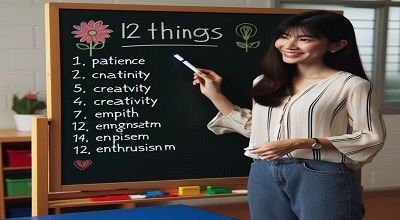Things A Teacher Needs
Being an effective teacher involves a combination of skills. Qualities and strategies to create a positive and productive learning environment.
Here are 12 things that a teacher needs to be effective in the classroom:
- Content Knowledge: A solid understanding of the subject matter being taught is crucial. Teachers need to be well-versed in the content to explain concepts, answer questions, and guide students effectively.
- Communication Skills: Effective communication is essential for conveying information, fostering understanding, and building positive relationships with students. This includes both verbal and non-verbal communication.
- Adaptability: Classrooms are dynamic environments, and teachers need to be adaptable to meet the diverse needs of students. Flexibility allows teachers to adjust their teaching methods, strategies, and materials as needed.
- Classroom Management: Establishing and maintaining a positive and well-organized classroom environment is crucial. Effective classroom management involves setting expectations, enforcing rules consistently, and creating a safe and respectful space for learning.
- Passion for Teaching: Enthusiasm for the subject matter and a genuine passion for teaching can inspire students and make the learning experience more engaging and enjoyable.
- Patience: Every student learns at their own pace, and teachers must be patient when addressing individual needs. Patience helps create a supportive atmosphere and allows students to feel comfortable asking questions.
Read more…
- Empathy: Understanding and relating to the experiences, challenges, and emotions of students is essential for building positive relationships. Empathetic teachers can better support their students both academically and emotionally.
- Creativity: Bringing creativity into teaching methods helps to capture students’ interest and makes learning more enjoyable. Creative approaches can involve diverse teaching strategies, activities, and assessments.
- Technology Integration: Incorporating relevant technology into lessons can enhance the learning experience and prepare students for the digital world. Teachers should be comfortable using educational technology tools and platforms.
- Continuous Learning: Education is an evolving field, and effective teachers are committed to ongoing professional development. Staying informed about new teaching methods, technologies, and educational research is crucial for improvement.
- Feedback and Assessment Skills: Providing constructive feedback and using various assessment methods to gauge student understanding are important aspects of effective teaching. This helps tailor instruction to meet individual needs.
- Team Collaboration: Collaborating with colleagues, parents, and other stakeholders contributes to a well-rounded education. Effective teachers build positive relationships with colleagues and work together to support the overall development of students.
Final Words
While these qualities are not exhaustive, they provide a foundation for effective teaching. Successful educators often possess a combination of these traits and continuously strive to enhance their skills for the benefit of their students.
